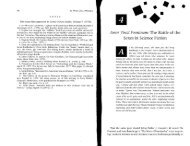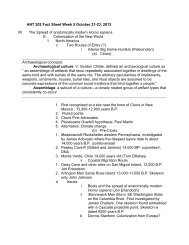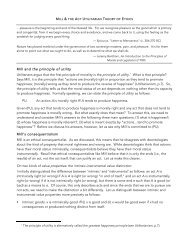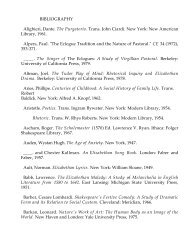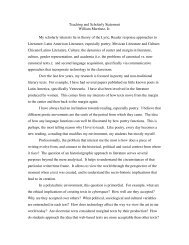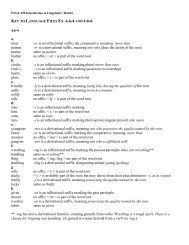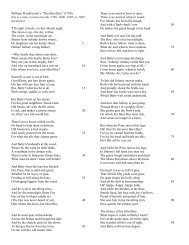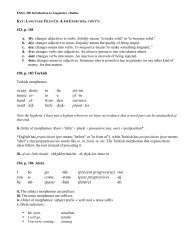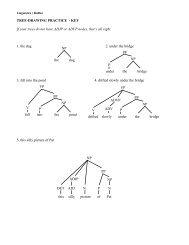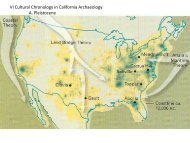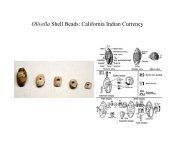On Explaining Existence (Real Possibility as the Key to Actuality)
On Explaining Existence (Real Possibility as the Key to Actuality)
On Explaining Existence (Real Possibility as the Key to Actuality)
Create successful ePaper yourself
Turn your PDF publications into a flip-book with our unique Google optimized e-Paper software.
16 PART ONE: EXISTENCE<br />
any particularly problematic presupposition-apart<br />
fi-om <strong>the</strong> epistemically optimistic yet methodologi-<br />
cally inevitable idea that <strong>the</strong>re are always re<strong>as</strong>ons<br />
why things are <strong>as</strong> <strong>the</strong>y are (<strong>the</strong> “principle of suffi-<br />
cient re<strong>as</strong>on”). To dismiss <strong>the</strong> question <strong>as</strong> improp-<br />
er or illegrtimate is fruitless. Try <strong>as</strong> we will <strong>to</strong> put<br />
<strong>the</strong> question away, it comes back <strong>to</strong> haunt us.27<br />
8. THE NOMOLOGICAL APPROACH<br />
Consider <strong>the</strong> line of re<strong>as</strong>oning set out in <strong>the</strong> antinomy<br />
of causation formulated in Table 2. Since <strong>the</strong><br />
<strong>as</strong>sertions (A) and (B) squarely contradict each o<strong>the</strong>r,<br />
it is ciear that <strong>the</strong>ses (1)-(4) constitute an inconsistent<br />
group of propositions. In consequence,<br />
one member of this quartet, at le<strong>as</strong>t, must be rejected.<br />
Let us survey <strong>the</strong> options for resolving this<br />
antinomy.<br />
Table 2 An Inconsistent Quartet<br />
(1) Everydung-that is, literally everythmg-that<br />
exists in nature h<strong>as</strong> a causal explanation. (The<br />
Principle of Causality.)<br />
(2) Natural-existence-<strong>as</strong>-a-whole must itself be<br />
counted <strong>as</strong> a natural thing: <strong>the</strong> universe itself<br />
qualifies <strong>as</strong> a thing or substance of some sort.<br />
(The Principle of Totalization: The entire<br />
universe that consists of things (substances) is<br />
itselfa thing (substance).)<br />
(A) The universe h<strong>as</strong> a causal explanation. (From (1)<br />
and (2).)<br />
(3) Causal explanations of existential facts require<br />
existential inputs <strong>to</strong> afford <strong>the</strong> requisite causes.<br />
(The Principle of Genetic Homogeneity.)<br />
(4) No existential inputs are available <strong>to</strong> explain <strong>the</strong><br />
existence of natural-existence-<strong>as</strong>-a-whole, <strong>the</strong><br />
<strong>to</strong>tality of things within <strong>the</strong> world (= <strong>the</strong><br />
universe). For any existent invoked by <strong>the</strong><br />
explanation would constitute part of <strong>the</strong><br />
explana<strong>to</strong>ry problem, thus vitiating <strong>the</strong> explanation<br />
on grounds of circularity. (The Principle of<br />
Causal Comprehension: Anythmg that stands in<br />
causally explana<strong>to</strong>ry connection with <strong>the</strong><br />
universe is <strong>the</strong>reby, ipsofuc<strong>to</strong>, a part of it.)<br />
(B) No (adequate) causal explanation can be given<br />
for <strong>the</strong> universe. (From (3) and (4).)<br />
(l)-rejem‘on. <strong>On</strong>e could abandon <strong>the</strong> Principle of<br />
Causality. This would pave <strong>the</strong> way for accepting<br />
<strong>the</strong> universe (“natural existence <strong>as</strong> a whole”) <strong>as</strong><br />
something whose existence just is uncaused. <strong>On</strong>e<br />
would accorhgly take roughly <strong>the</strong> following h e:<br />
There are things in <strong>the</strong> world because once upon a time<br />
<strong>the</strong>re w<strong>as</strong> an alpha-event that w<strong>as</strong> <strong>the</strong> origination of a<br />
world-with-things-in-it. And this event just happened; it<br />
w<strong>as</strong> uncaused. And it had <strong>to</strong> be so. For it makes no sense<br />
<strong>to</strong> suppose a cause of <strong>the</strong> initiation (<strong>the</strong> beginning-<strong>to</strong>-<br />
be) of things-<strong>as</strong>-a-whole, because causal explanations<br />
require existential inputs <strong>to</strong> operate <strong>as</strong> causes.<br />
The obvious shortcoming of this position is in-<br />
herent in its commiment <strong>to</strong> <strong>the</strong> questionable idea<br />
that causation necessarily requires preexisting things<br />
<strong>to</strong> act <strong>as</strong> causes.<br />
(2) -yqidkn. -<strong>On</strong>e could abandon-<strong>the</strong> Principle of<br />
TotaLzation and maintain that <strong>the</strong> <strong>as</strong>&dation of<br />
<strong>the</strong> entire universe itself <strong>to</strong> particular things must<br />
be abandoned. Everydung-<strong>as</strong>-a-whole is seen <strong>as</strong> sui<br />
generis and thus not <strong>as</strong> a literal thing that, along<br />
with particular things, can be expected <strong>to</strong> conform<br />
<strong>to</strong> thing-oriented principles such <strong>as</strong> <strong>the</strong> Principle of<br />
Causality. Accordingly, we would exempt <strong>the</strong> universe<br />
itself fi-om membership in <strong>the</strong> cl<strong>as</strong>s of things<br />
that have cause.<br />
The difficulty with this approach lies in <strong>the</strong><br />
problem of establishing <strong>the</strong> grounds of <strong>the</strong> purported<br />
impropriety. We unhesitatingly view galaxies<br />
<strong>as</strong> individual things whose origin, duration, and<br />
nature need explanation-why not <strong>the</strong>n <strong>the</strong> cosmos<br />
<strong>as</strong> a whole? This synoptic question is, admittedly,<br />
more challenging and inconvenient. But why<br />
should that make it illegitimate?<br />
(3)~ejection.<br />
<strong>On</strong>e could reject (3) <strong>as</strong> we have<br />
in fact already proposed <strong>to</strong> do. Yet in dismissing<br />
netic homogeneity one would (and should)<br />
abandon it al<strong>to</strong>ge<strong>the</strong>r, but ra<strong>the</strong>r subject it <strong>to</strong> a<br />
tinction. <strong>On</strong>e could <strong>the</strong>n say that <strong>the</strong>re are two<br />
ferent kinds of causal explanation, those<br />
proceed in terms of <strong>the</strong> causal agency of (preexisting)<br />
things-substance causality or efficient causality-and<br />
those that proceed in terms of th<br />
operation of la* pi+aciples-law caus<br />
nomological causality. The former, efficient<br />
of causality is clearly not up <strong>to</strong> <strong>the</strong> job. For<br />
one who <strong>as</strong>ks for a natural explanation of <strong>the</strong> ~0




